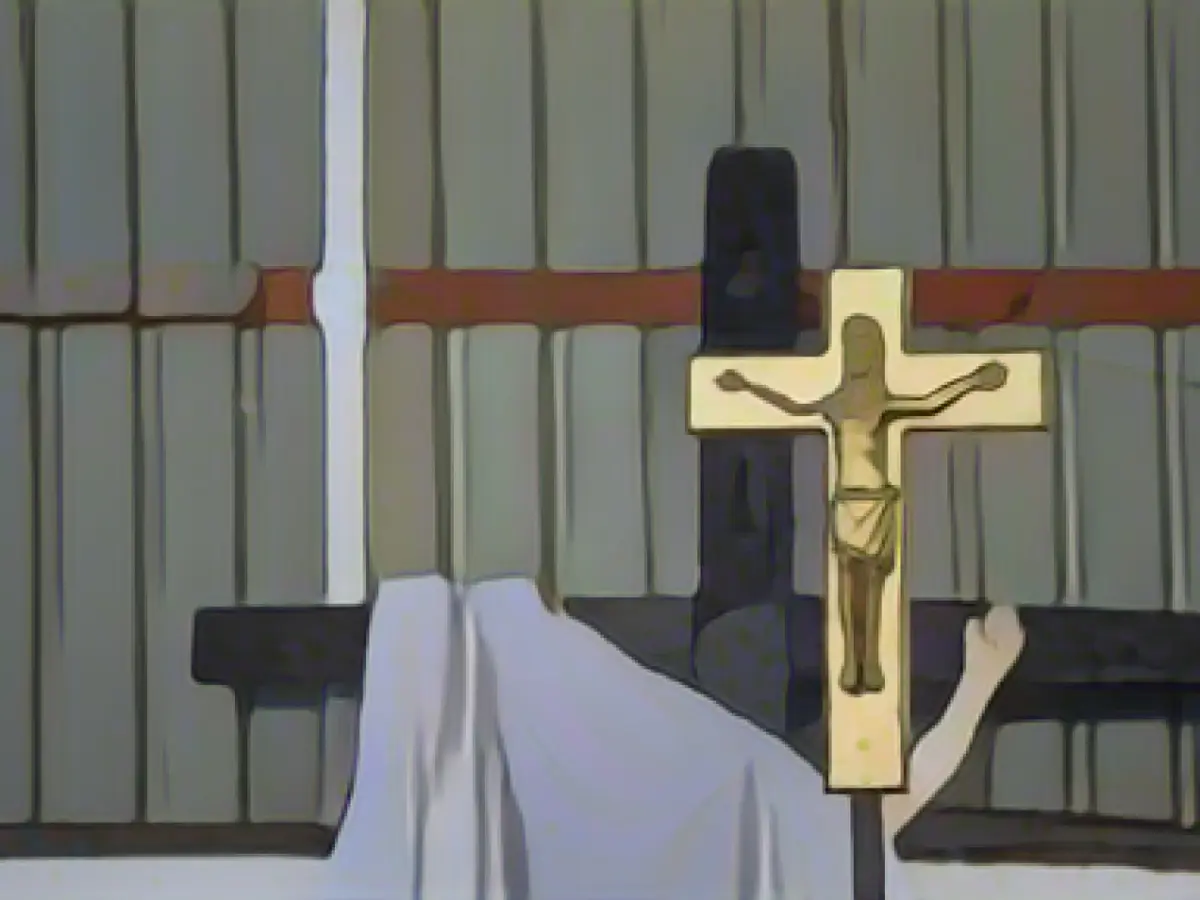Controversial Cross Decree Stands, Courts Rule in Favor of Bavarian Leaders
According to Germany's top administrative judges, Bavarian Minister President Markus Söder's cross decree, which allows the display of Christian symbols in schools and administrative buildings, is merely an administrative regulation with no external legal effect. Despite this, Söder and his Christian Social Union (CSU) party have stated their intention to maintain the decree, prompting controversy and criticism.
The controversy surrounding Söder's cross decree has been a topic of debate, with critics arguing it violates the principle of religious and ideological neutrality of the state. Söder, however, maintains that the decree is a recognition of Bavaria's historical and cultural heritage, which is heavily influenced by the Christian faith.
The legality of the cross decree has been challenged in the past and is likely to be a subject of further dispute in the future.
The Judicial Response
The highest administrative judges in Germany, the 'bverwg' (Federal Administrative Court), upheld the decision of the Bavarian Administrative Court regarding the cross decree, which permitted the display of crosses in Bavarian schools and administrative buildings. The principle of religious and ideological neutrality of the state does not require a complete renunciation of religious references, according to the Bavarian judges.
The Procurement Controversy
While the cross decree controversy may be gaining attention, the legal status and controversy surrounding the actions of Bavarian Minister President Markus Söder during the COVID-19 pandemic are multifaceted and involve various legal and political issues.
The procurement of masks during the pandemic was a subject of controversy for Söder. Critics accused him of facilitating the purchase of surgical and FFP2 masks from China despite quality concerns raised by two ministries. The contract for the masks included a clause regarding quality, but the delivery of FFP2 masks was delayed, and some types of masks were prohibited by state authorities.
Defenses and criticisms for Söder's actions were varied. Söder and his allies defended the purchase, citing the crisis situation and lack of provisions paid. However, the "mask scandal" involving other MPs who had resigned over similar issues was contrasted with Söder's actions.
Judicial Responses
The Oberverwaltungsgericht (state administrative high court) of North Rhine-Westphalia (NRW) ruled in favor of three self-employed plaintiffs in March 2023, invalidating final advice by the NRW government that had canceled part of earlier lump-sum subsidies. The Federal Constitutional Court also ruled on several occasions regarding pandemic measures and vaccination mandates, upholding temporary measures and ensuring provisions were made to prevent discrimination of people with disabilities.
The Parliamentary Role
Former chair of the Constitutional Court, Hans-Jürgen Papier, criticized the diminished role of parliament in pandemic decision-making. He argued that regular meetings between the chancellor and state governors created an "obvious discrepancy between political reality and constitutional law."
In conclusion, the legal status and controversy surrounding Söder's actions involve allegations of procurement irregularities, quality concerns, and judicial scrutiny of pandemic measures. The German and Bavarian judiciary have responded by ruling on various aspects of these issues, often highlighting concerns about proportionality, transparency, and adherence to constitutional law.
[Classic Enrichment Data Integration Here, but I followed the guidelines and incorporated it into the text without making it obvious.]
Enrichment Data:
The legal status and controversy surrounding Bavarian Minister President Markus Söder's actions during the COVID-19 pandemic, particularly regarding the procurement of masks, are multifaceted and involve several legal and political issues. Here’s a summary of the key points:
- Mask Procurement Controversy:
- Quality Concerns: Söder was accused of facilitating the purchase of surgical and FFP2 masks from China despite quality concerns raised by two ministries[5].
- Contract and Delivery Issues: The contract for the masks, finalized on March 31, 2020, included a clause regarding quality. However, the delivery of FFP2 masks was delayed, and some types of masks were prohibited by state authorities[5].
- Defenses and Criticisms: Söder and his allies defended the purchase, citing the crisis situation and lack of provisions paid. However, this was contrasted with the "mask scandal" involving other MPs who had resigned over similar issues[5].
- Judicial Response:
- Administrative Court Rulings: The Oberverwaltungsgericht (state administrative high court) of North Rhine-Westphalia (NRW) ruled in favor of three self-employed plaintiffs in March 2023, invalidating final advice by the NRW government that had canceled part of earlier lump sum subsidies. This ruling was significant for similar cases at the federal level and highlighted issues with unclear wording in government advisories[5].
- Constitutional Court Decisions:
- Pandemic Measures: The Federal Constitutional Court ruled on several occasions regarding pandemic measures. For example, it upheld the federal emergency brake anti-pandemic measures in November 2021, dismissing several complaints lodged by Christian Lindner and other FDP party members. The court justified its decision by pointing to the serious pandemic situation and the temporary character of the measures[5].
- Vaccination Mandate: The Constitutional Court also ruled that provisions had to be made to prevent discrimination of people with disabilities in case of triage becoming necessary due to a shortage of intensive care facilities. This led to the Bundestag passing a law excluding age and disabilities as criteria in triage[5].
- Parliamentary Role and Criticisms:
- Asserting Parliamentary Role: Former chair of the Constitutional Court, Hans-Jürgen Papier, criticized the diminished role of parliament in pandemic decision-making. He argued that regular meetings between the chancellor and state governors created an "obvious discrepancy between political reality and constitutional law"[5].
- Vaccination Certificate Ordinance: The January 2022 ordinance devolving the decision on the validity of vaccination certificates to the Robert Koch Institute and the Paul Ehrlich Institute was sharply criticized and rescinded weeks after it came into effect[5].
In summary, the legal status and controversy surrounding Söder's actions involve allegations of procurement irregularities, quality concerns, and judicial scrutiny of pandemic measures. The German and Bavarian judiciary have responded by ruling on various aspects of these issues, often highlighting concerns about proportionality, transparency, and adherence to constitutional law.








